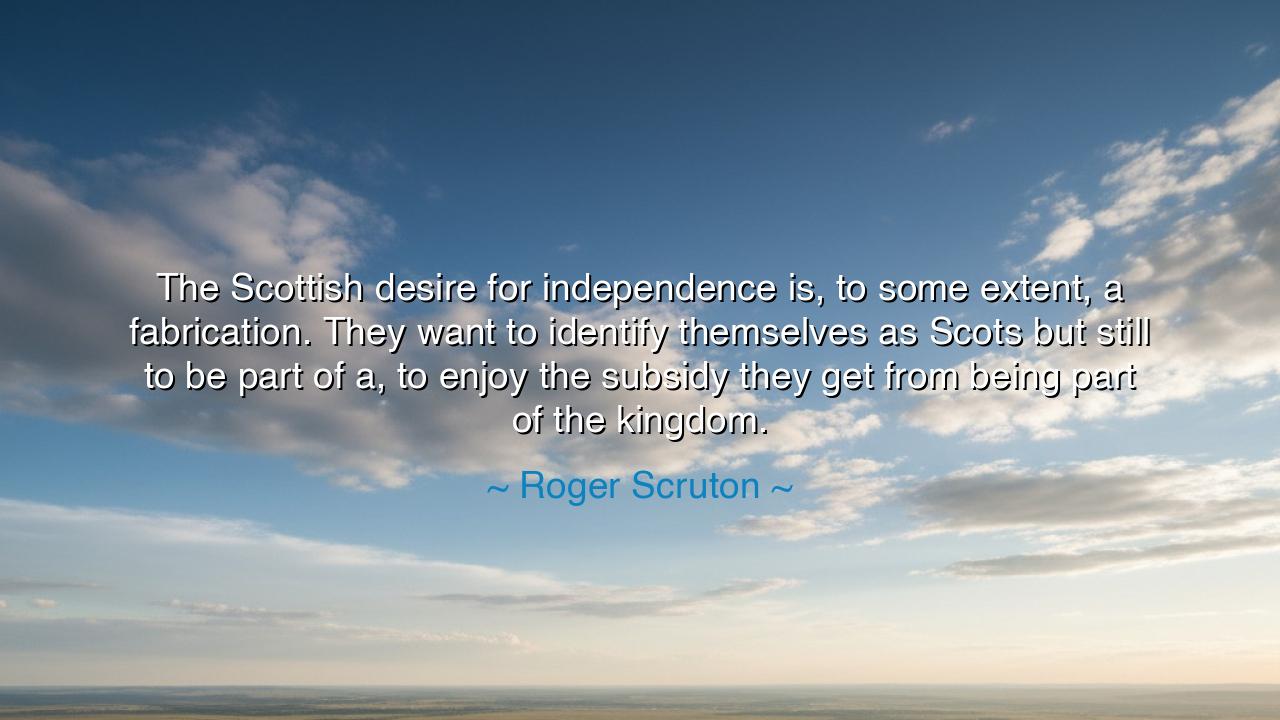
The Scottish desire for independence is, to some extent, a
The Scottish desire for independence is, to some extent, a fabrication. They want to identify themselves as Scots but still to be part of a, to enjoy the subsidy they get from being part of the kingdom.






“The Scottish desire for independence is, to some extent, a fabrication. They want to identify themselves as Scots but still to be part of, to enjoy the subsidy they get from being part of the kingdom.” Thus spoke Roger Scruton, the philosopher of belonging and nationhood, whose thought wove together love of home with the sober understanding of its responsibilities. His words are not meant as scorn, but as reflection — an attempt to uncover the paradox at the heart of modern identity: the longing to be independent, yet the unwillingness to bear the full burden of that independence. In his statement, Scruton captures a tension that lies deep within not only Scotland, but within every nation and soul that seeks freedom without cost, distinction without duty.
To understand the weight of his words, one must first recall the historical moment that stirred them — the great debate over Scottish independence, which reached its height during the referendum of 2014. In that age, Scotland stood at a crossroads, asking itself whether to part ways with the United Kingdom, its centuries-old partner, or to remain within its fold. The call for sovereignty rose with passion and poetry, echoing the voices of old — of William Wallace, of Robert the Bruce, of the countless who fought for Scotland’s right to stand as a nation. Yet amid this chorus of pride, Scruton discerned a quieter, more complex truth: that for many, the dream of separation was woven not purely from the desire for self-rule, but from a yearning for identity — a need to be distinct while still secure, free while still supported.
For Scruton, the fabrication he speaks of is not deceit in the moral sense, but illusion in the philosophical one — the self-deception that independence can exist without sacrifice. True sovereignty, he reminds us, is not a sentiment but a structure; it demands not only pride but provision, not only spirit but substance. In his eyes, to seek independence while still depending upon the resources and stability of the union is to crave the symbol without the substance. This, he suggests, is a temptation of modern times — to desire the glory of freedom without the discipline that sustains it.
The ancients knew this struggle well. The Greek city-states, proud and self-governing, often cried for liberty from alliance — yet in their isolation they found weakness. When Athens sought dominion and Sparta sought purity, their rivalry led to ruin. So too, in the modern world, nations have learned that interdependence is the price of prosperity. Scruton, with the wisdom of a conservative mind, saw that a union like Britain’s — forged in shared history, blood, and enterprise — should not be so easily unstitched by the passions of the moment. To preserve the kingdom, he believed, was not to deny identity but to root it in cooperation.
Consider the story of post-war Europe, divided by walls and ideology. When those walls fell, nations regained their independence — yet many, weary of isolation, sought again the bonds of unity through the European Union. They learned, as Scotland might, that identity does not vanish within partnership, nor does cooperation destroy pride. The true danger lies not in unity, but in the illusion that one can live apart while still partaking in the fruits of togetherness. Scruton’s wisdom thus reaches beyond Scotland, to the very heart of modern civilization: the need to reconcile belonging with freedom, and to recognize that one cannot endure without the other.
Yet in his critique, there is also empathy. Scruton understood that identity — the need to call something one’s own — is as essential to the human soul as breath. The Scots, he knew, are a people of deep memory, of song and spirit, whose pride was forged in hardship and whose sense of nationhood endured through centuries of union. His challenge, then, was not to dismiss their desire, but to refine it: to remind them, and all of us, that independence must be more than a feeling; it must be a responsibility embraced in full. Freedom that clings to comfort is no freedom at all, for the truly free must also be prepared to stand alone.
So let the lesson of Roger Scruton’s reflection be this: that in both life and nation, one must balance identity and duty, freedom and fellowship. Do not mistake pride for power, nor self-expression for self-sufficiency. To belong is not to be enslaved; to cooperate is not to be diminished. True independence, whether of a people or a person, is not the rejection of bonds but the willing acceptance of their weight. Let each generation, then, examine its desires — to see whether it seeks liberty in truth or in comfort. For as Scruton teaches, the highest form of freedom is not separation, but fidelity — the courage to stand within the bonds that give life meaning.
Thus, O listener, remember: every nation, like every soul, must decide whether it will be a child of sentiment or of strength. To be independent is to accept the burdens of responsibility; to be united is to share in the blessings of belonging. Between these two lies the art of wisdom — the delicate harmony of self and society, of pride and partnership. And it is in that harmony, not in division, that the true spirit of a people endures.






AAdministratorAdministrator
Welcome, honored guests. Please leave a comment, we will respond soon